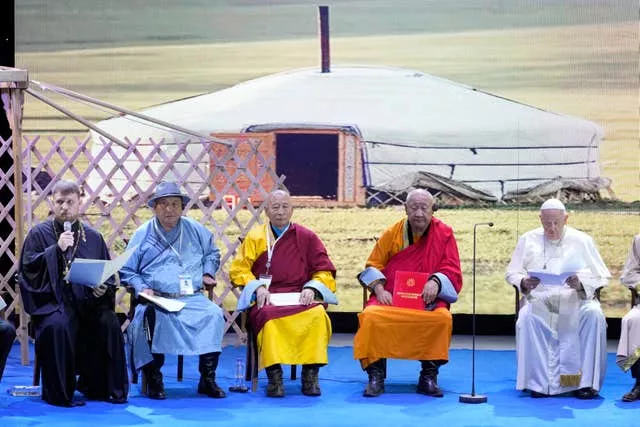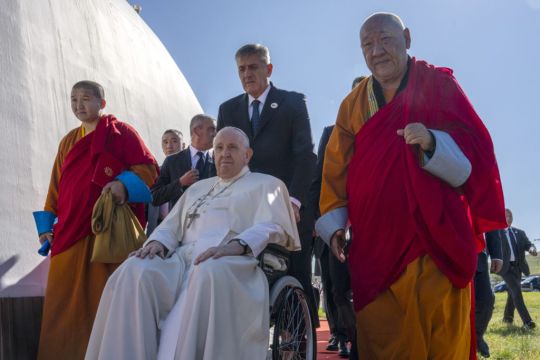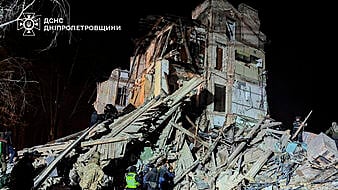With China’s crackdown on religious minorities as a backdrop, Pope Francis has joined Mongolian shamans, Buddhist monks and a Russian Orthodox priest to highlight the role that religions can play in forging world peace, as he presided over an interfaith meeting highlighting Mongolia’s tradition of religious tolerance.
Francis listened intently as a dozen faith leaders – Jewish, Muslim, Bahai, Hindu, Shinto and evangelical Christian among them – described their beliefs and their relationship with heaven.
Several said the traditional Mongolian ger, or round-shaped yurt, was a potent symbol of harmony with the divine – a warm place of family unity, open to the heavens, where strangers are welcome.
“The fact that we are meeting together in one place already sends a message: it shows that the religious traditions, for all their distinctiveness and diversity, have impressive potential for the benefit of society as a whole,” Francis said in remarks that cited Buddhist writings, his namesake St Francis of Assisi and the existential philosopher Soren Kierkegaard.
“If the leaders of nations were to choose the path of encounter and dialogue with others, it would be a decisive contribution to ending the conflicts continuing to afflict so many of the world’s peoples,” he said.

The interfaith event, held at a theatre in Mongolia’s capital Ulaanbaatar on Sunday, came midway through Francis’s four-day visit to the country – the first by a Pope.
He is in Mongolia to minister to one of the world’s smallest and newest Catholic communities and highlight Mongolia’s tradition of tolerance in a region where the Holy See’s relations with neighbouring China and Russia are often strained.
According to statistics by the Catholic non-profit group Aid to the Church in Need, Mongolia is 53% Buddhist, 39% atheist, 3% Muslim, 3% Shaman and 2% Christian.
Later on Sunday, Francis presided over a Mass in the capital’s sports stadium attended by an estimated 2,000 people, including many Chinese pilgrims.
There, he kissed babies held up to him and sought to encourage Mongolia’s Catholic flock, telling them they know well the fatigue of the Biblical figure of Abraham, journeying through the desert.
“All of us are ‘God’s nomads’, pilgrims in search of happiness, wayfarers thirsting for love,” he said.

The Vatican’s difficult relations with China and Beijing’s crackdown on religious minorities have been a constant backdrop to the trip, even as the Vatican hopes to focus attention instead on Mongolia and its 1,450 Catholics.
No mainland Chinese bishops are believed to have been allowed to travel to Mongolia, whereas at least two dozen bishops from other countries across Asia have accompanied pilgrims for the events.
Hong Kong Cardinal-elect Stephen Chow, who made a historic visit to Beijing earlier this year, was on hand and accompanied 40 pilgrims to Mongolia, saying it was an event highlighting the reach of the universal church. He declined to discuss the absence of his mainland Chinese counterparts, focusing instead on Francis and the importance of his visit to Mongolia for the Asian church.
“I think the Asian church is also a growing church. Not as fast as Africa – Africa is growing fast – but the Asian church also has a very important role to play now in the universal church,” he told reporters.
Chinese President Xi Jinping has demanded that Catholicism and all other religions adhere strictly to party directives and undergo “Sinicization”. In the vast Xinjiang region, that has led to the demolition of an unknown number of mosques, but in most cases it has meant the removal of domes, minarets and exterior crosses from churches.
The Vatican and China did sign an accord in 2018 over the thorny issue of Catholic bishop nominations, but Beijing has violated it.







